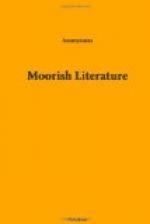On the morn of John the Baptist, just
at the break of day,
The Moors upon Granada’s fields
streamed out in bright array.
Their horses galloped o’er the sod,
their lances flashed in air,
And the banners that their dames had wrought
spread out their colors
fair.
Their quivers bright flashed in the light
with gold and silk brocade,
And the Moor who saw his love was there
looked best in the parade,
And the Moor who had no lady love strove
hard some love to gain.
’Mong those who from Alhambra’s
towers gazed on that warrior train,
There were two Moorish ladies there whom
love had smitten sore;
Zarifa one, and Fatima the name the other
bore.
Knit by warm friendship were their hearts
till, filled with jealous pain,
Their glances met, as one fair knight
came prancing o’er the plain.
Zarifa spoke to Fatima, “How has
love marred thy face!
Once roses bloomed on either cheek, now
lilies take their place;
And you, who once would talk of love,
now still and silent stay.
Come, come unto the window and watch the
pageant gay!
Abindarraez is riding by; his train is
full in view;
In all Granada none can boast a choicer
retinue.”
“It is not love, Zarifa, that robs
my cheek of rose;
No fond and anxious passion this mournful
bosom knows;
My cheeks are pale and I am still and
silent, it is true,—
For, ah! I miss my father’s
face, whom fierce Alabey slew.
And did I crave the boon of love, a thousand
knights were fain
To fight for me in service true on yonder
flowery plain.
And all the love I give to each to give
me back again.
And for Abindarraez, whose heart and valiant
might,
You praise and from the window watch,
with rapturous delight——”
The lady stopped, for at their feet knelt
down the well-loved knight.
THE BRAGGART REBUKED
“If thou art brave in battle’s
hour
As thou art bold
in pleasure’s rout;
If thou canst make the lances fly
As thou canst
fling thy words about;
“If thou canst in the vega fight
As thou the ladies’
eyes canst praise;
And show on horseback half the skill
That marks thee
in the dance’s maze;
“Meet with the briskness of the
joust
The challenge
of the deadly lance,
And in the play of scimitars
Be sprightly as
in festive dance;
“If thou art ready in the field
As thou art nimble
on the square;
And canst the front of battle face
As though thou
flirtest with the fair;
“If thou dost don thy shining mail
As lightly as
thy festive suit,
And listenest to the trumpet call
As though it were
thy lady’s lute;
“And if, as in the gamesome hour
Thou flingest
round the rattling reed
Against the foeman’s moated camp,
Thou spurrest
on thy thundering steed;




